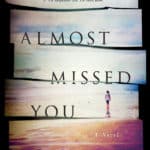What sort of book is it?
I sit at book festivals, my wares splayed before me, and sometimes envy my tablemates who can give a simple question a simple answer.
My novels have been pitched, sold, and marketed as “upmarket women’s fiction with elements of suspense.” Some circles call them book club fiction, a term I wish was more universal because it suits: They leave readers something to mull over and talk about (club optional). Put another way, they’re page-turners, but the kind of page-turners with Reading Group Guides in the back.
They’ll call it as they see it
Of course (there’s always an of course), once your work is out in the world, it’s no longer yours to categorize. Review outlets, booksellers, and ultimately readers will call it like they see it, which in my case includes “domestic suspense” (increasingly accurate), “psychological thriller,” “mystery,” and “suspenseful family drama.” The top-ranking Amazon category for my debut, Almost Missed You? Detective fiction. (Technicality: There aren’t exactly detectives in the book. Not that I’m complaining.)
I know enough to leave marketing to the professionals—and labels have everything to do with marketing. Focusing on what you can control means writing, as we’re all rightly advised, what you love to read. Which brings me (alas) back to upmarket women’s fiction with elements of suspense.
Frankly, the subject of genre barely came up when I signed with my agent and publisher: I knew what my work was, and they agreed, and knew just what to do with it. I learned, however, that it will come up eventually. Because on the other end of everything you do with it are readers. Who might have demanding questions when they encounter you or your work. You know, really nervy, in-your-face stuff. Like, “What sort of book is it?”
From the other side of many such conversations, here are 3 Rules for Writing Cross-Genre Suspense
(Or cross-genre anything, really.)
I don’t have to reach for obscure comparative authors who combine women’s fiction and suspense, and nor should you for whatever cross-section you’re targeting.
Almost Missed You begins when a man leaves his wife in the middle of a vacation—and takes their three-year-old son with him. Everyone who knows them is blindsided, and the search for answers drives the suspense, while the story alternates POV to show facets of their marriages, friendships, and beliefs that have brought them to the brink of disaster.
Not That I Could Tell, my March 2018 release, also begins with a disappearance—of a young mother whose husband is quickly suspected of domestic violence. Told from the point-of-view of two neighbors, suspicions again drive the suspense, but the core questions raised surround friendship, truth, and our responsibility to one another. The missing woman, too, has a voice.
Bestselling thriller writer Kate Moretti endorsed Not That I Could Tell with the closer “Fans of Liane Moriarty will adore Jessica Strawser!” and my heart took flight. The brilliant Australian novelist behind such blockbusters as The Husband’s Secret and Big Little Lies is one of my favorites, and indeed writes in a comparable cross-section.
An agent once told me, when I was on submission, “You cannot use a suspenseful construct to tell a story driven by relationships.” When I tried to clarify his feedback in comparison to several top sellers at the time that did, he admitted he “had been meaning to read them.” (Hint: If you’re better read in your genre than a prospective agent, they aren’t a match.)
Aim to know your cross-section well enough to hold your own in conversation with a top agent or editor in that space. Over lunch with my pub team, I love it when the conversation turns to titles we’ve all read on both sides of the line I walk: It’s Always the Husband, I Liked My Life, Reconstructing Amelia … It both affirms and broadens the way I see things.
-
Realize it won’t be for everyone
Combining elements of two genres does not necessarily double your audience. There will be those who are expecting something different—perhaps a story more in one camp or the other—and who will not be pleasantly surprised.
“I wouldn’t call this much of a thriller,” a few of my most critical reviewers have grumbled. I always think: I agree! I never said it was! But their neighbor or their newspaper’s book reviewer said it was, and that returns us to factors beyond the author’s control.
Genre writers have a job to meet the reader expectations in their genre.
When you’re not cleanly in a category, you might not meet all those expectations. You’ll need to take it in stride.
-
Know that when you do reach the right reader, you can really reach them
My most enthusiastic reviews praise the novel because of its cross-genre appeal. Here’s a snippet from The Book Review’s take:
“This book was not exactly what I was expecting it to be, since, in my opinion, it’s not a traditional psychological thriller … this is yet another one of those books that is hard to categorize. Having said that, this story blew me away with its intensity, emotion, characterizations and dialogue. The pacing is so perfectly timed, the mere thought of putting the book down was untenable.”
A representative 5-star from another reader: “Great book, with elements of romance, mystery, suspense, and psychological study.” (Plenty of the reviewers are male, too. Take that, “women’s fiction” label.)
I’ve been collecting messages from readers eager to ask a lingering question, or to share their own what-if moments, alongside 2 a.m. texts from friends blaming me for their missed bedtimes. That’s the kind of engagement I look for as a reader.
It’s the kind of engagement I thrive on as a writer. And with the right approach and a ready mindset, you can absolutely cross genre lines to get it.


Jessica Strawser is the editor-at-large at Writer’s Digest magazine, where she served as editorial director for nearly a decade and became known for her in-depth cover interviews with such wide-reaching talents as David Sedaris, Alice Walker, David Baldacci and Patricia Cornwell.
She is the author of the novels Almost Missed You, named to Barnes & Noble’s Best New Fiction shortlist upon its March 2017 release, and Not That I Could Tell, coming in March 2018. She has written for The New York Times Modern Love, Publishers Weekly and other fine venues, and lives with her husband and two children in Cincinnati. She loves connecting with fellow writers and readers on Facebook and Twitter.
Copyright: Shutterstock





